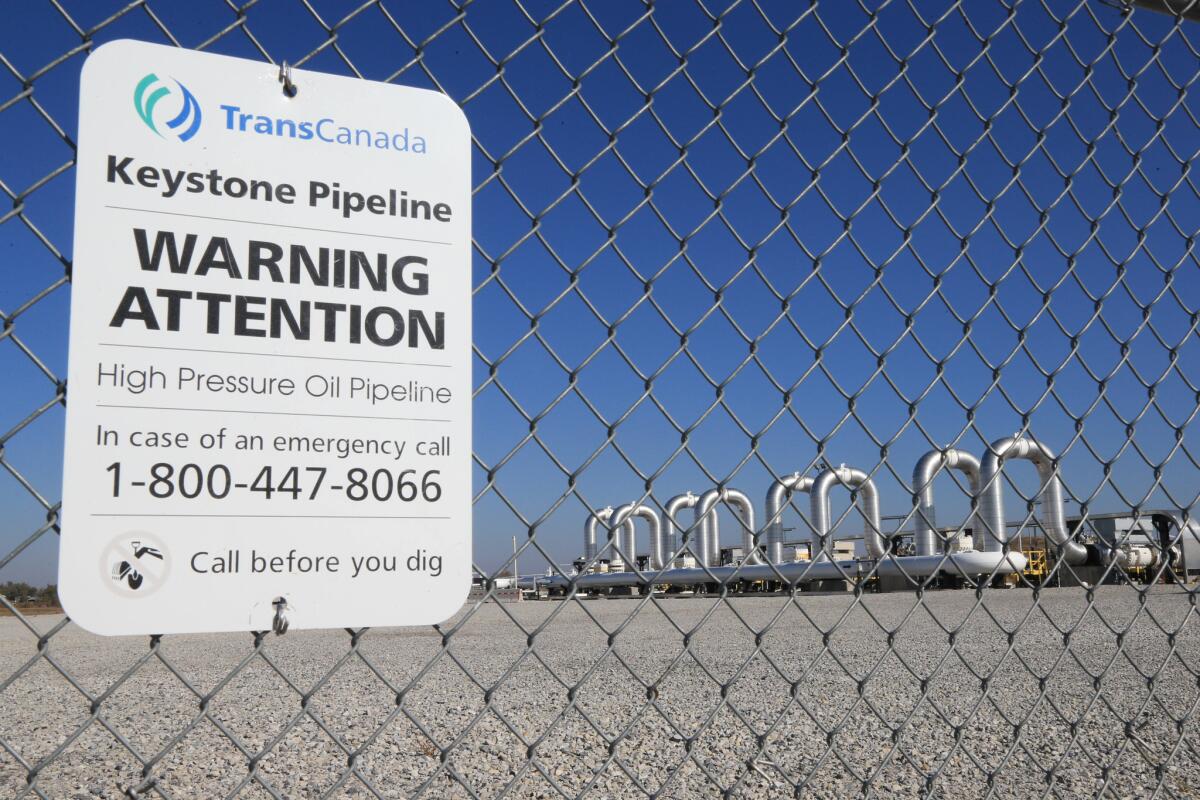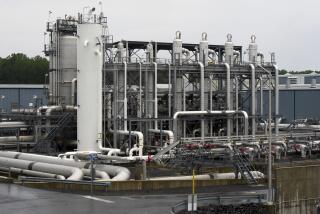Canadian company sues the Obama administration for rejecting Keystone XL pipeline

TransCanada Corp. alleges in a lawsuit Canadian company sues the Obama administration for rejecting Keystone XL pipelinethat President Obama exceeded his constitutional power by denying construction of Keystone XL pipeline.
The Canadian company that proposed a 2,639-mile cross-border pipeline to the U.S. Gulf Coast is suing the Obama administration for rejecting it last November.
In a lawsuit filed Wednesday in the U.S. District Court for the Southern District of Texas in Houston, Calgary-based TransCanada Corp. alleged that President Obama exceeded his constitutional power by denying construction of Keystone XL.
The lawsuit argues that the U.S. Constitution “expressly commits regulation of domestic and international commerce to Congress,” which had passed legislation authorizing the construction.
NEWSLETTER: Get the day’s top headlines from Times Editor Davan Maharaj >>
The pipeline, which TransCanada first proposed in 2008, would have helped deliver up to 900,000 barrels of crude oil daily from the tar sands of the Canadian province of Alberta through the U.S. Great Plains and to the Gulf Coast.
In a statement Wednesday, TransCanada said the U.S. State Department acknowledged the presidential denial wasn’t based on the project’s merits: “Rather, it was a symbolic gesture based on speculation about the perceptions of the international community regarding the Administration’s leadership on climate change and the President’s assertion of unprecedented, independent powers.”
Russ Girling, the company president and chief executive, was more biting in November in his criticism of the decision when he accused the Obama administration of appearing “to have said yes to more oil imports from Iran and Venezuela, over oil from Canada, the United States’ strongest ally and trading partner [and] a country with rule of law and values consistent with the U.S.”
Girling said that “misplaced symbolism was chosen over merit and science” and that “rhetoric won out over reason.”
In addition to the lawsuit, TransCanada filed a notice of intent to initiate a claim Wednesday under Chapter 11 of the North American Free Trade Agreement seeking to recover more than $15 billion in costs and damages it alleges it suffered “from the United States’s breach of its NAFTA obligations.”
It echoes the lawsuit in arguing that the Obama administration felt it “necessary to demonstrate U.S. leadership on climate change” by denying the cross-border permit, “even though the Administration concluded multiple times that the pipeline would have no significant impact on climate change.”
However, Canadian Green Party Leader Elizabeth May said she expects that TransCanada will lose its NAFTA claim if not the lawsuit too.
“The larger economic power virtually always wins,” said May, a lawyer by training and the only Green Member of Parliament in Canada’s House of Commons.
Join the conversation on Facebook >>
No Canadian company has so far succeeded in a Chapter 11 claim against the U.S. government.
TransCanada “can huff and puff and complain, but the U.S. made the right decision” in rejecting Keystone XL, May said.
The company also announced on Wednesday that it expects to report a multibillion-dollar after-tax writedown in its fourth-quarter results due to the permit denial.
Guly is a special correspondent
ALSO
Samuel L. Jackson vs. Donald Trump: Who’s your money on?
L.A. County prosecutors won’t charge Bill Cosby in two sexual assault cases
Republicans push again for an Obamacare alternative, with Donald Trump a looming worry
More to Read
Start your day right
Sign up for Essential California for news, features and recommendations from the L.A. Times and beyond in your inbox six days a week.
You may occasionally receive promotional content from the Los Angeles Times.






